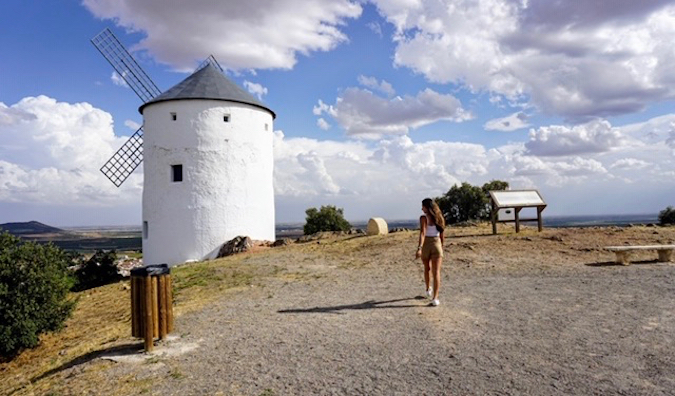
Posted: 2/22/2020 | February 22nd, 2020
Teaching overseas is one of a great way to earn money while you travel, stay in one place longer, and get to deeply experience another culture. I spent years teaching in Thailand and Taiwan and they were some of the most impactful experiences of my traveling. Living in a foreign culture, trying to get by day to day, and learning to create a life for yourself is a surefire way to become a more confident you and give you a deeper understanding of yourself.
I get a lot of emails from people about teaching overseas and one of the most asked about destinations is Spain! While we’ve written about the destination before, I wanted to add in another perspective from someone who just did it last year.
Natasha is a local Austinite who graduated from school and moved to Spain for a year. Here she is explaining how she did it and how you can too!
Tell us about yourself!
Natasha: I was born in Atlanta, Georgia, but my family moved to India when I was two months old. After a year, we moved to Australia, where I grew up until I was 9. Then we moved to Vancouver where I stayed until I was 15.
I consider myself to be from Australia, Canada, and the US in almost equal parts, and ethnically I am Indian and Pakistani. I double-majored in international relations and Latin American studies at UT-Austin.
In my free time, I make YouTube videos about travel and I am devoted to health and fitness. I also cook and practice yoga.
You recently spent some time teaching in Spain. Tell us how you got started doing that. Was it easy to figure out the process and find a job?
I studied abroad in Madrid in college. While I was there, I met some people who were English-language assistants and kept in touch with them after I returned home. I knew I wanted to take a gap year and travel after graduation, so I reached out to them and they told me about different programs I could apply for.
I looked into a few, but the government program “Auxiliares de Conversación” was free and had good reviews, so I chose to apply to that one. It allows foreigners to visit and work as teaching assistants. You’ll be paired with a teacher and help the students learn English.
The application is quite daunting. It required an essay, two letters of recommendation, a lot of legal paperwork, and other forms. The essay I wrote was about a page long, essentially a letter of intent explaining why I was interested in the program and the qualities that make me fit for the position.
The program also requires an official college transcript as well, but it accepts applicants from diverse educational backgrounds. so as long as you show keen interest, have good letters of recommendation, and have decent grades you should be fine!
I didn’t decide to join this program until the beginning of March, but I would suggest starting the process as soon as it is available in January. That will give you more time to jump through all the bureaucratic hoops. After receiving your acceptance, I suggest booking your visa appointment immediately, as these fill up fast!

Did you have any prior teaching experience? Is experience necessary?
I didn’t have any teaching experience, and the Auxiliar de Conversación program doesn’t require you to. As long as you have (or are completing) your bachelor’s degree and are a native English speaker, you are eligible.
What was an average day like?
You are only required to work 12-16 hours a week with this program, so a workday is typically about four hours. Since we’re English-language assistants, we are paired with an English teacher and don’t have to create a curriculum for the whole class.
On an average day as an auxiliar, the teacher I worked with would mostly have me walk around and assist students with the activities she had assigned them to do. Since I was an assistant and not the main teacher, my job mostly consisted of providing help like that.
The teacher for the younger grades would have me work one-on-one with students that were falling behind or had special needs, to give them more attention, but we usually worked on the same activities as the other students. For about 10-15 minutes of the class, I would sometimes give a presentation or play vocabulary games, such as Bingo or Hangman.
I was never required to teach an entire lesson, but I would occasionally have to manage small groups of students. This allowed them to participate more since they would not be as shy to speak English (and it’s easier to control a few students than a whole class).
Regarding the actual teaching, it was the easiest and smoothest part of my time in Spain. As long as you can keep the students interested and engaged you won’t have any issues.
Did you have any unexpected challenges?
Many! I lived about an hour’s walk from my school, which was inconvenient and isolating. It took me a while to figure out the bus system, so adapting to my location was the first challenge.
However, the biggest challenge I faced was having to come back to the US for a month, because I didn’t have a visa. I was informed that I didn’t need a visa prior to entering Spain, but upon arrival, I would need to get my NIE (Número de Identidad de Extranjero) and I would be set.
Well, when I arrived, I was the only applicant without a visa. I went to eight different foreign consulates, and no one knew if I had to leave Spain to get a visa. Ultimately I had to fly back to the US, score an almost-impossible-to-get appointment with the Spanish consulate, and get my visa. The bureaucratic system is slow and very tedious, so try to talk to former auxiliares if you can (there are lots of Facebook groups for this).

What is one thing you wish you knew before you started teaching?
I wish I knew that one person’s experience could be very different from the next. I had an amazing overall experience; however, parts of my life didn’t go as I expected.
I went in expecting to make great connections with my colleagues more than anyone else, but the environment at the school I worked at wasn’t very welcoming. A lot of teachers at my school didn’t live in the community (they commuted from pueblos as far as an hour away). This made it hard to form close friendships. Moreover, my school was comprised of teachers who were still completing their exams, so every year the teachers changed schools. That meant that the sense of community was not very strong.
Fortunately, I became friends with other auxiliares in my area and was welcomed warmly into their community. I became friends with teachers at other schools, took trips with them, and received lots of help with life in general in Spain.
What kind of salary can auxiliares expect?
Auxiliares earn a “scholarship” rather than a salary. I was paid 1,000 EUR/month ($1,100 USD) during my contract. I would say that one should expect around 700-1,000 EUR per month ($770-1,100 USD) (or about 15 EUR/hour ($16.50 USD). Auxiliares in Madrid received the same “scholarship” as I did, but the cost of living in that region is much higher.
If you are paid 700 EUR, you usually work 12 hours a week instead of 16, and you can definitely try and teach private English lessons to earn more.

What are your top three tips for someone interested in teaching in Spain?
1. Arrive with at enough to live off of for at least three months. I was fortunate to live in a city with decent prices for accommodation. I had two roommates and spent around 250 EUR/month ($275 USD) on rent. Groceries, rent, and transportation were my main expenses, around 650 EUR ($715 USD) for all of those (plus some miscellaneous things). This left me with just a bit of money to use for travel.
In the Valencia region, the government was three months late to start paying us and always late by at least a few days to a week after the first paycheck. Since it’s not a lot of money, you’ll want to have a lot of savings. That way, if you’re paid late, you will have enough money to get by.
2. Research where you want to work. I chose Madrid as my first choice and Andalucía as my second. I would have also liked to live in Barcelona, but that wasn’t an option. I applied late to the program and existing auxiliares have priority for where they are stationed. As a new applicant (and a late one), I was sent to Valencia.
When choosing regions, be aware that a region does not necessarily mean you will end up in the city it’s named for. By that I mean, the “Madrid” region does not only mean the city of Madrid but rather the entire region around the city. Regions are like states, and so you could end up living two hours (or more) from the capital of the region.
You should also take into account the language spoken in the region. Where I lived, people spoke Valenciano just as much (if not more) than Spanish, and school was conducted in valenciano (a dialect of Catalan). Luckily, Valenciano has similarities to Spanish.
However, if you’re placed in the Basque Country (northern Spain), they speak Euskara, which has no similarities to Spanish. So if your goal is to practice or learn Spanish, make sure you choose to live in a region that speaks it.
Weather is another aspect to consider. While in the summer it is warm almost everywhere, winters can be quite cold (more so in the north). If you’re not a fan of cold weather, consider living closer to the south and the sea.
There are auxiliar Facebook groups and blogs that have plenty of information and anecdotes about different regions, which can help you make your decision.
3. Learn some Spanish. Understand that you could be placed in a pueblo very far from a big city, so brush up on your Spanish a little. It isn’t mandatory to teach English, but it will really come in handy if you’re in a smaller location and want to connect more with the locals (and your colleagues).
Want to Learn More About Teaching Abroad?
Here are some helpful posts about teaching English overseas to help you learn more:
- The 9 Best Places to Teach English Overseas
- Can You Teach English Without a TEFL?
- How Emily Taught English to Fund her RTW Adventure
- How Oneika Gets Teaching Jobs Around the World
For more teaching tips and advice you can follow Natasha on Instagram and YouTube.
P.S. – Want to meet other travelers in real life? This year we launched The Nomadic Network, a platform created to help travelers connect, learn, and get inspired in real life! Here are our upcoming events if you want to take part: Seattle (2/17), Austin (2/18), Fort Lauderdale (2/19), Portland (2/19), San Francisco (2/20), Los Angeles (2/23), Detroit (2/24), Boston (2/24), Dublin (2/24), San Diego (2/24), London (2/25), Chicago (2/25), and NYC (3/10).
Ready to Teach Overseas? Get My Comprehensive Guide
 This digital guide will put you ahead of your competition, help you land a high-paying job with a reputable company, and give you first-hand knowledge from real teachers! Get started today with this downloadable PDF (for your computer, e-reader, or mobile device) with the book PLUS 12 interviews about life as a teacher, plus job advice from one of the industry’s top recruiters!
This digital guide will put you ahead of your competition, help you land a high-paying job with a reputable company, and give you first-hand knowledge from real teachers! Get started today with this downloadable PDF (for your computer, e-reader, or mobile device) with the book PLUS 12 interviews about life as a teacher, plus job advice from one of the industry’s top recruiters!
Book Your Trip to Spain: Logistical Tips and Tricks
Book Your Flight
Find a cheap flight by using Skyscanner or Momondo. They are my two favorite search engines, because they search websites and airlines around the globe so you always know no stone is being left unturned.
Book Your Accommodation
You can book your hostel with Hostelworld as they have the largest inventory. If you want to stay somewher eother than a hotel, use Booking.com, as they consistently return the cheapest rates for guesthouses and cheap hotels. My favorite hostels in Spain are:
- Sungate One (Madrid) – Super clean, in a great location, and very social. They organize pub crawls, communal meals, and walking tours too!
- Kabul (Barcelona) – This is the best party hostel in the city. It’s fun, social, and really easy to have fun and meet people.
- La Banda (Seville) – Another fun and social hostel. They have an on-site bar and host huge communal dinners too. It’s lively and agreat place to meet people and party.
Don’t Forget Travel Insurance
Travel insurance will protect you against illness, injury, theft, and cancellations. It’s comprehensive protection in case anything goes wrong. I never go on a trip without it, as I’ve had to use it many times in the past. I’ve been using World Nomads for ten years. My favorite companies that offer the best service and value are:
- World Nomads (for everyone below 70)
- Insure My Trip (for those over 70)
Looking for the best companies to save money with?
Check out my resource page for the best companies to use when you travel! I list all the ones I use to save money when I travel — and I think they will help you too!
Looking for more information on visiting Spain?
Check out my in-depth destination guide to SPain with more tips on what to see and do, costs, ways to save, and much, much more!
The post How to Find a Job Teaching in Spain appeared first on Nomadic Matt's Travel Site.
February 22, 2020 at 02:30PM
fom https://ift.tt/2SRWvyu
by IHholiday Travel trip
Water Hack Burns 2lb of Fat OVERNIGHT
ResponderEliminarAt least 160000 women and men are using a simple and secret "liquids hack" to burn 2 lbs every night as they sleep.
It's scientific and it works every time.
Here's how you can do it yourself:
1) Get a clear glass and fill it with water half full
2) Now use this awesome HACK
and you'll become 2 lbs thinner in the morning!